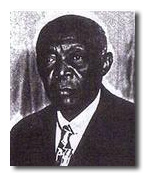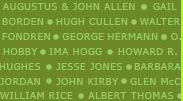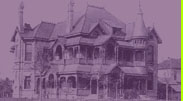GREAT CITIZENS - DR. BENJAMIN JESSE COVINGTON
 Black physician, civic leader and the son of former slaves, Benjamin Jesse Covington figured prominently in establishing the first city hospital for Blacks. Convington was born "in the sixth year of freedom" on his family's farm near Marlin, Texas. Because the farm home burned down when he was a child, destroying family records kept in a Bible, he did not know his birth date.
Black physician, civic leader and the son of former slaves, Benjamin Jesse Covington figured prominently in establishing the first city hospital for Blacks. Convington was born "in the sixth year of freedom" on his family's farm near Marlin, Texas. Because the farm home burned down when he was a child, destroying family records kept in a Bible, he did not know his birth date.
Covington spent his early childhood on the farm, planting, chopping and picking cotton. He attended public school near Marlin and in 1886, at the age of 15 or 16, he enrolled at Hearne Baptist Academy. Supporting himself through college as a janitor and bell ringer, he graduated in 1892 and then taught for a short time at a country school near Marlin. He soon left the post, however, because of the animosity of some members of the community who felt that his teacher's salary of %75 per month, plus some $25 in private tutoring fees, was more than a black should earn.
In 1894, Convington moved to Houston to work as a bookkeeper for a half-brother. The following year, he entered Meharry Medical College in Nashville, Tennessee. Once again working his way through school, he graduated as a physician in 1900. He returned to practice medicine in Wharton, Texas, having earlier worked there as a doctor with a temporary permit. Subsequently he moved to Yoakum where he met and married Jennie Belle Murphy, with whom he later had a daughter.
In June 18, 1903, the day preceding the Juneteenth celebration, Dr. Covington moved his practice permanently to Houston. Because of his skill and dedication, it grew rapidly. Soon his 10-bed hospital on Canal Street could not adequately meet the demand. He began planning for a larger hospital for blacks about 1910, but was interrupted by World War I. During the influenza epidemic of World War I, Dr. Covington developed a formula for the cure of the flu. Learning of his discovery, the local United States Army medical corps requested and secured his formula.
In 1911, Dr. Covington built his two story, fifteen-room house at Dowling and Hadley streets. It was here that he and his wife entertained such black dignitaries as Booker T. Washington and Marian Anderson.
Involved in the reorganization of the Lone Star Medical Association after his graduation from medical school, Dr. Covington served as secretary-treasurer for ten years before members elected him president in 1920. Some five years later, he and four other Houston doctors established the Houston Negro Hospital, a forerunner of the present Riverside General Hospital.
Throughout his life, Dr. Covington exhibited a deep concern for community health and welfare. Active in a number of civic associations as well as a leading member of the Antioch Baptist Church, he was honored by such organizations as the Omega Fraternity and the Business and Professional Men's club of Houston. Some 10 years before his death at the age of 90 or 91 the Masonic Lodge, of which he was a long-time member, established a medical scholarship in his name in recognition of his 50 years of professional service. Dr. Covington practiced medicine until he died on July 21, 1961 in Houston.






